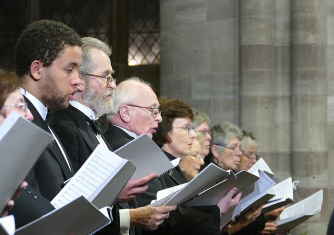Details
Hereford Cathedral
Cathedral Close
Hereford
Herefordshire
HR1 2NG
England
Programme
John Ireland – These things shall be
Ralph Vaughan Williams – Dona Nobis Pacem
Ralph Vaughan Williams – Serenade to Music
George Butterworth – A Shropshire Lad (Rhapsody for Full Orchestra)
Performers
Rebecca Hardwick – soprano
Susanna Spicer – mezzo-soprano
Paul Smy – tenor
Malachy Frame – bass-baritone
Geraint Bowen – Conductor
Hereford Choral Society
Hereford Sinfonia
Other concerts in this Series (+)
Programme Note
The three choral works in this concert were written in consecutive years from 1936 and it is easy to identify different reactions in them to the tensions of the time:
Vaughan Williams’s Serenade to Music was originally composed for 16 soloists ,but later arranged in a choral version, which is the one to be performed in this concert. It sets Shakespeare’s words from The Merchant of Venice saying that ‘he man that hath no music in himself [is only] fit for treasons, stratagems and spoil’ and that music and harmony comefrom the heavens.
Harmony, this time of the human kind, is the central theme of Ireland’s These Things Shall Be, which provides an aspirational view of mankind. It is a setting of the poem by J Addington Symonds which may have raised eyebrows, particularly in 1937, with its opening reference to the rising of ‘… a loftier race than e’er the world hath known’ but the central tenet is that ‘Nation with nation, land with land, unarmed shall live as comrades free’. Ireland’s stirring music is uplifting throughout, likewise aspiring to a harmony that would have seemed distant at this time.
There is no doubting the darkness and sense of foreboding in Vaughan Williams’ Dona nobis pacem. Its premiere in 1936 fell two days before the anti-Fascist ‘Battle of Cable Street’ in London’s Whitechapel and will have reflected such dark times and a desire to be given peace. VW’s texts were taken from the Mass, three poems by Walt Whitman, a political speech, and sections of the Bible, providing a powerful and dramatic work, ultimately leading to its uplifting and optimistic ending: ‘O man, greatly beloved, fear not!’.
George Butterworth’s Rhapsody on A Shropshire Lad, was written as an orchestral postlude to his song cycle and premiered in 1913. It is credited with influencing the rhapsodies of other English composers of the period, including Ralph Vaughan Williams.

 Your events at Classical Events
Your events at Classical Events

